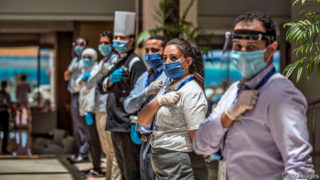Domestic travellers have revived home-sharing firms. But the big hotel chains think they can fight back
IT HAS been a gloomy year for the travel business. The covid-19 pandemic has wrecked airlines, cruise-ship operators and many other parts of the industry. With the end of the northern hemisphere’s summer holidays, things may get gloomier still. The World Travel & Tourism Council, a trade body, this summer increased its forecast of the number of travel jobs that will be lost because of the pandemic worldwide to 197.5m, or around 60% of the total before coronavirus hit.
Even as lockdowns have been relaxed, and some travel has resumed, airlines, cruise lines and tour operators are all still losing money hand over fist. But one sector is proving more resilient: travel accommodation. Hotels and home rentals were not hit as hard by the pandemic, and appear to be bouncing back faster. This is in part thanks to “staycationers”, ie, people holidaying in their own countries.
In America in the three months to June, total airline revenue from passengers fell by 91% compared with a 70% drop in earnings for hotel rooms. Gross operating profit per available room, a standard measure for the hotel industry, went positive in July, according to data from STR, a research firm. Airlines can only dream of reaching such a position. Some executives in America say that air-passenger numbers will need to double from current levels before their carriers stop burning cash. However, many forecasters think they could in fact drop in the coming months as the school holidays end and travel restrictions, particularly in Europe and Asia, intensify to stem a second wave of infections.
When people in Europe and America were told to “stay at home” earlier this year, hotels and home-sharing platforms were whacked. Revenues fell year on year in the second quarter by 54% at Wyndham, 72% at Marriott and 77% at Hilton, three of the world’s biggest hotel chains. Airbnb, the world biggest home-sharing platform, did no better, with a tumble of 70%. The online travel agents were hit harder still. Expedia, the world’s biggest online travel agent, saw turnover plunge by 82%. Its arch-rival, Booking.com, did worse still with a drop of 84%.
Analysts think that some listed hotel firms—such as Wyndham, the world’s biggest chain (by number of hotels)—may well make profit in the current quarter as they cut costs through lay-offs and demand recovers somewhat. Still, there remains a lot of red ink in the industry. Most of the companies, whether old-fashioned hotel chains or zippy tech startups such as Airbnb and Expedia, use an asset-light model. Airbnb owns none of its properties to rent; it is a platform for users and owners to meet. Likewise, the big hotel chains do not own most of their locations; they franchise their brands to independent hotel owners and operators. If bookings overall recover the big brands will earn a share of the revenues and can return to profit. Many independent operators whose hotels and properties are in left-behind locations, such as city centres, are still in trouble. But it is the banks which have lent them money, not the chains that have lent them their name, that have most to fear if they default.
In America, no-frills hotels with car parking have done best of late as household budgets, crushed by high unemployment or fear of it, switch from pricier foreign holidays to cheap staycations with the car. Unlike planes, getting behind the wheels helps people keep their distance from others. In China, where the pandemic has increased the wealth gap, luxury hotels have done better than budget inns, as rich travellers unable to fly abroad spend the money on swanky accommodation at home.
Of various providers of lodgings, home-sharing platforms seem to have done best in the recovery so far, notes Alex Brignall of Redburn, a broker. A 90% drop in future bookings in April pushed Airbnb into an existential crisis and forced the startup to shelve a planned stockmarket listing. In the three months to June it lost $400m before interest, taxes, depreciation and amortisation. In May the company’s chief executive, Brian Chesky, burst into tears in a video conference call as he culled a quarter of his workforce.
But the company’s turnaround has been remarkable. In Europe, demand for non-hotel accommodation is now down by just 20% year on year, compared with a whopping 60% for hotels. In some parts of America, such as rural areas, demand is up by as much as 25% year on year. As if to celebrate the recovery, in August Airbnb filed for its initial public offering. Expedia’s and Booking.com’s home-sharing divisions have also reported booming sales.
At first glance, this trend is puzzling. The pandemic has increased the importance of cleanliness, and surveys show that travellers associate branded hotels with a relatively high and consistent level of cleaning. Hilton, for instance, has made a great fuss about using household cleaning products such as Lysol and Dettol in all its 18 brands. Marriott has promised to use baffling “electrostatic sprayers” across its properties. The amount of elbow grease that goes into Airbnb and other vacation rentals, conversely, is hit-or-miss at the best of times.
One reason vacation rentals have taken off is that they are a way to maintain social distance, says Henry Harteveldt of Atmosphere Research Group. Rentals of guest rooms with shared facilities–the concept of renting out the spare guest airbed that gave Airbnb its name—are still devastated. But the rental of entire properties has soared. Even if the cleaning is not up to scratch, Mr Harteveldt observes, many travellers have realised that this option avoids other risks such as the need to talk to human receptionists, meet others in shared lobbies or touch dirty lift buttons.
Has covid-19 permanently tipped the balance against the big hotel brands? Richard Clarke of Bernstein, a research firm, argues not. Some chains, such as Hilton, are developing and expanding new “homestay” brands that have kitchens and other facilities, to challenge the likes of Airbnb. Stronger chains will also continue to grow by squeezing out weaker rivals. Accor and Premier Inn, for instance, are waiting to devour the market share of Travelodge, a heavily indebted British chain that is trying to restructure its liabilities.
And although hotels in city centres that rely on international visitors are doing badly, those serving domestic markets, or that can be driven to, are benefitting from the staycation boom. Wyndham’s share price is almost as high as it was before covid-19. And no wonder: 96% of Wyndham’s guests are domestic travellers and 87% of its American hotels are in driving distance of suburbs, cities, or motorways.
A big question is whether the likes of Airbnb are really taking market share from the core business of hotel chains: one-night stays and business travellers. Demand from the latter has been devastated by the pandemic. Events and conventions, former money-spinners, are currently dead. But the hotel brands are confident that if and when business travel resumes, visitors will choose hotels again. “There will always be some form of business interaction that can’t be done over a Zoom call,” says Phil Cordell, Hilton’s global head of new brand development. Moreover, some firms and insurers still insist that business travellers stay in hotels rather than rented homes—a position that has hardened since the pandemic began.
Luring business travellers away from hotels used to be Airbnb’s next ambition. But when the pandemic hit, it axed these initiatives and decided to retrench to its core business of longer leisure lets. The resurgence of home-sharing since the pandemic has been impressive. But Airbnb’s recovery appears to be built on a thinner segment of the market than before covid-19. Insider Intelligence, a research firm, forecasts that the number of Americans who will use Airbnb this year will drop by 60%—the first time that the company has experienced negative user growth—even as bookings increase. Chekitan Dev, a hospitality-industry expert at Cornell University, notes that if Airbnb set out to destroy the hotel industry—as its founders used to promise—“they haven’t broken it yet.”
By The Economist





